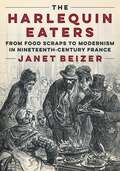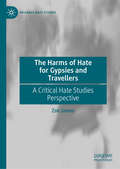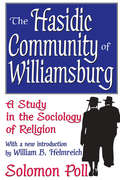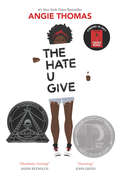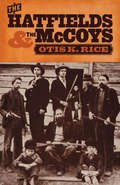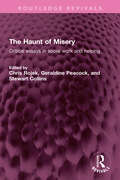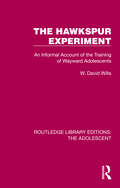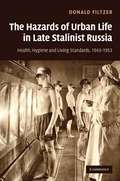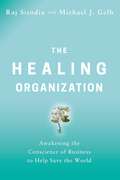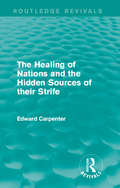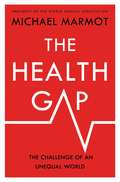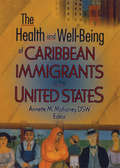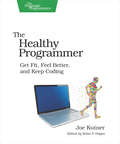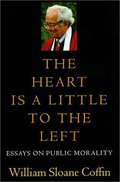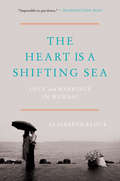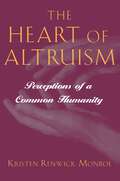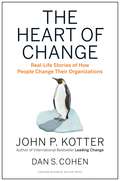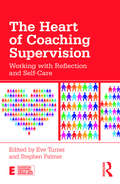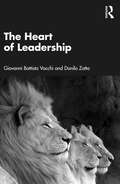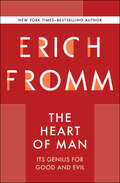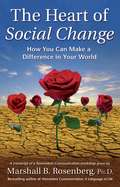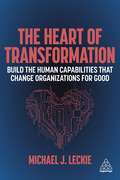- Table View
- List View
The Harlequin Eaters: From Food Scraps to Modernism in Nineteenth-Century France
by Janet BeizerHow representations of the preparation, sale, and consumption of leftovers in nineteenth-century urban France link socioeconomic and aesthetic history The concept of the &“harlequin&” refers to the practice of reassembling dinner scraps cleared from the plates of the wealthy to sell, replated, to the poor in nineteenth-century Paris. In The Harlequin Eaters, Janet Beizer investigates how the alimentary harlequin evolved in the nineteenth and early twentieth centuries from the earlier, similarly patchworked Commedia dell&’arte Harlequin character and can be used to rethink the entangled place of class, race, and food in the longer history of modernism. By superimposing figurations of the edible harlequin taken from a broad array of popular and canonical novels, newspaper articles, postcard photographs, and lithographs, Beizer shows that what is at stake in nineteenth-century discourses surrounding this mixed meal are representations not only of food but also of the marginalized people—the &“harlequin eaters&”—who consume it at this time when a global society is emerging. She reveals the imbrication of kitchen narratives and intellectual–aesthetic practices of thought and art, presenting a way to integrate socioeconomic history with the history of literature and the visual arts. The Harlequin Eaters also offers fascinating background to today&’s problems of food inequity as it unpacks stories of the for-profit recycling of excess food across class and race divisions.
The Harms of Hate for Gypsies and Travellers: A Critical Hate Studies Perspective (Palgrave Hate Studies)
by Zoë JamesGypsies and Travellers have often been overlooked as victims of hate crime and discrimination. This book redresses that exclusion by shining a light on the harms of hate experienced by Gypsies and Travellers in the UK. In doing so James explores how hate permeates all aspects of their lives and identifies the hate crimes, incidents, and speech that they are subject to. It goes on to explore how hate against Gypsies and Travellers occurs as discrimination, social exclusion and criminalisation and how that hate is embedded within the language and practice of neoliberal capitalism. This book provides new insights to critical criminology and ways of understanding hate by using the critical hate studies perspective to gain a full appreciation of the harms of hate. As a consequence of this, the book is able to do justice to Gypsies' and Travellers' experiences of hate by extrapolating how harms manifest and the impact they have on Gypsies’ and Travellers’ social and personal identities. The book explains and acknowledges how hate harms imbue Gypsies' and Travellers' daily lives, including common events of serious abuse and assault, regular ill-treatment in provision of services, and everyday micro-aggressions. It argues hate experienced by Gypsies and Travellers can only be fully recognised through an analysis of the neoliberal capitalist context within which it occurs and the harmful subjective experience it engenders. The author’s expertise in this area, having carried out research with Gypsies and Travellers for 25 years, underpins the book with excellent empirical knowledge and research-informed discussion.
The Hasidic Community of Williamsburg: A Study in the Sociology of Religion
by Solomon PollThe Hasidim of the Williamsburg section of Brooklyn separate themselves not only from non-Jews and unreligious Jews but also from religious Orthodox Jews whose religious ideology, intensity, and frequency of traditional religious behavior do not meet Hasidic standards. These Hasidim create a sociological wall between themselves and other Jews whom they do not consider traditionally religious. This being the case, how is it the Hasidim are able to survive, indeed thrive, well into the twenty-first century while maintaining their social isolation and avoiding assimilation into the American culture, especially living amongst the cultural and ethnic diversity and temptations of New York City? The Hasidic Community of Williamsburg explores and explains this sociological phenomenon.Poll explains some main tenets on the which the Hasidim of Williamsburg have come to rely: making secular activities sacred; incorporating modern devices into their lives to promote and advance their own religious observance; separating themselves, using daily activities including the clothes they wear, the food they eat, the places they gather, and even the language they speak among themselves; and by incorporating American values into their lives while simultaneously casting aspersions on and demonizing all those who do not follow their exact way of life.Until now the Hasidim have successfully achieved social isolation while also continuing to thrive as a group. They have created a well-functioning community with social controls and little or no deviation. However, as the outside society continues to advance and the Hasidim, themselves, further incorporate the very American ideals of hard work, economic success, progress, prosperity, and profit into their own community value system, will their social controls remain effective or become weakened?
The Hate U Give: The Hate U Give And On The Come Up
by Angie Thomas<P>Sixteen-year-old Starr Carter moves between two worlds: the poor neighborhood where she lives and the fancy suburban prep school she attends. The uneasy balance between these worlds is shattered when Starr witnesses the fatal shooting of her childhood best friend Khalil at the hands of a police officer. Khalil was unarmed.<P> <P>Soon afterward, his death is a national headline. Some are calling him a thug, maybe even a drug dealer and a gangbanger. Protesters are taking to the streets in Khalil’s name. Some cops and the local drug lord try to intimidate Starr and her family. What everyone wants to know is: what really went down that night? And the only person alive who can answer that is Starr. <P>But what Starr does—or does not—say could upend her community. It could also endanger her life. <br> <p><b>Winner of the 2018 William C. Morris award</b> <P><b>A New York Times Bestseller</b></p>
The Hatfields & the McCoys
by Otis K. Rice&“A captivating account of two families whose stubbornness and loyalty were exceeded only by their capacity for a terrible revenge.&” —Southern Living The Hatfield-McCoy feud has long been a famous part of Appalachian history, but over the years it&’s become encrusted with myth and error. Novelists, motion picture producers, television writers, and others have neglected to separate fact from fiction, and sensationalized events that needed no embellishment. Using court records, public documents, official correspondence, and other sources, Otis K. Rice presents an account that frees, as much as possible, truth from legend. He weighs the evidence carefully, avoiding the partisanship and the attitude of condescension and condemnation that have characterized many of the writings concerning the feud. He also sets the feud in the social, political, economic, and cultural context of eastern Kentucky and southwestern West Virginia in the late nineteenth and early twentieth centuries. By examining the legacy of the Civil War, the weakness of institutions such as the church and education system, the exaggerated importance of family, the impotence of the law, and the isolation of the mountain folk, Rice gives new meaning to the origins and progress of the feud. These conditions help explain why the Hatfield and McCoy families, which have produced so many fine citizens, could engage in such a bitter and prolonged vendetta.
The Haunt of Misery: Critical essays in social work and helping (Routledge Revivals)
by Chris Rojek Stewart Collins Geraldine PeacockFirst published in 1989, The Haunt of Misery offers social workers and students critical essays for critical times. Faced with unreflective wealth creation and the fragmentation of the counterculture, social work is perceived as failing to meet the needs of the client. Many social workers are left feeling angry, stranded and confused. Written by academics and professionals, the essays range over social work and unemployment, the crisis of AIDS and HIV infection, drug use, client collectives, the elderly, the ethnic minorities, professionalism, and self-management. The authors offer constructive criticism of existing social work practice and suggest radical and exciting issues for the profession in the 1990s and beyond.
The Hawkspur Experiment: An Informal Account of the Training of Wayward Adolescents (Routledge Library Editions: The Adolescent)
by W. David WillsOriginally published in 1941 and written in an attempt to dispute the popular assumption at the time that a ‘bit of discipline’ is what is needed for the correction of young men who show delinquent tendencies, this book is much more than that. Basically an account of a kind of voluntary Borstal Institution of which the author was head from 1936 to 1940, its interest on reissue in 1967 lay in the fact that it contained the germinal ideas of most of the day’s newest methods in penal treatment, not just as ideas, but in practice. Here is the therapeutic community in embryo, here are the beginnings of group therapy, of inmate participation in treatment, of therapy through relationships. None of them are mentioned by name – the names had not been invented; but anyone who wanted to understand the trends in the treatment of delinquent and maladjusted people at the time would find it all here in simple untechnical English. The book is also an account of an enthralling experience, exciting and interesting in itself, apart from any social significance. Just before the camp started, Alec Paterson said to David Wills, ‘Do you really think you can run a place of this kind without the use of punishment?’ Wills said he didn’t know, but looked forward to trying. Readers of this book may judge for themselves how far he succeeded. A particularly interesting feature of this edition is the account of the subsequent lives of the many boys who were at Hawkspur.
The Hazards of Urban Life in Late Stalinist Russia
by Donald FiltzerThis is the first detailed study of the standard of living of ordinary Russians following World War II. It examines urban living conditions under the Stalinist regime with a focus on the key issues of sanitation, access to safe water supplies, personal hygiene and anti-epidemic controls, diet and nutrition, and infant mortality. Comparing five key industrial regions, it shows that living conditions lagged some fifty years behind Western European norms. The book reveals that, despite this, the years preceding Stalin's death saw dramatic improvements in mortality rates thanks to the application of rigorous public health controls and Western medical innovations. While tracing these changes, the book also analyzes the impact that the absence of an adequate urban infrastructure had on people's daily lives and on the relationship between the Stalinist regime and the Russian people, and, finally, how the Soviet experience compared to that of earlier industrializing societies.
The Headscarf as a Business Card: A Qualitative Case Study on Styles and Expressions of Berlin Muslim Women
by Juliane KanitzIn her book, Juliane Kanitz not only examines the frequently asked question of why Muslim women wear a headscarf, but also concentrates on how it is worn. She is concerned with the cultural, aesthetic and fashionable preferences of women and not primarily with the religious motives that are otherwise often the focus of attention. In addition to a contribution to research on the Muslim headscarf, the author presents theoretical and empirical supplements to Islamic fashion and Islam in Germany as a whole. She also discusses the debate on Europeanization, in which arguments against Muslims are put forward, and develops some perspectives on the topic of the headscarf in Germany that have not yet been taken into account, made possible by the new perspective of fashion.
The Healing Organization: Awakening the Conscience of Business to Help Save the World
by Michael J. Gelb Raj SisodiaThe image of modern corporations has been shaped by a profits over people approach, but we are at a point where business must take the lead in healing the crises of our time. The Healing Organization shows how corporations can become healing forces.Conscious Capitalism pioneer Raj Sisodia and organizational innovation expert Michael J. Gelb were inspired to write this book because of the epidemic of unnecessary suffering connected with business, including the destruction of the environment; increasing numbers living paycheck-to-paycheck and barely surviving; and rising rates of depression and stress leading to chronic health problems.Based on extensive in-depth interviews and inspiring case studies, Sisodia and Gelb show how companies such as Shake Shack, Hyatt, KIND Healthy Snacks, Eileen Fisher, H-E-B, FIFCO, Jaipur Rugs and DTE Energy are healing their employees, customers, communities and other stakeholders. They represent a diverse sampling of industries and geographies, but they all have significant elements in common, besides being profitable enterprises:Their employees love coming to work.They have passionately loyal customers.They make a significant positive difference to the communities they serve.They preserve and restore the ecosystems in which they operate.The enmity and dividedness between those who champion unfettered capitalism and those who advocate socialism is exacerbating rather than solving our problems.In a world that urgently needs healing on many levels, this is a movement whose time has come. The Healing Organization shows how it can be done, how it is being done, and how you can begin to do it too.
The Healing of Nations and the Hidden Sources of their Strife (Routledge Revivals: The Collected Works of Edward Carpenter)
by Edward CarpenterOriginally published in 1915 in the middle of World War I, Carpenter explores the effects that the war was having on society and humankind as a whole from first-hand experience. In particular, papers focus on the differences between Germany and England, the causes of the war and suggestions for restoration and recovery when the war has ended. Carpenter details all of this in a realistic way drawing on matters such as class to put forward his anti-war stance as well as philosophical approaches to coping with tragedy. This title will be of interest to students of history, sociology and politics.
The Health Gap: The Challenge of an Unequal World
by Michael Marmot<p>In this groundbreaking book, Michael Marmot, president of the World Medical Association, reveals social injustice to be the greatest threat to global health <p>In Baltimore’s inner-city neighborhood of Upton/Druid Heights, a man’s life expectancy is sixty-three; not far away, in the Greater Roland Park/Poplar neighborhood, life expectancy is eighty-three. The same twenty-year avoidable disparity exists in the Calton and Lenzie neighborhoods of Glasgow, and in other cities around the world. <p>In Sierra Leone, one in 21 fifteen-year-old women will die in her fertile years of a maternal-related cause; in Italy, the figure is one in 17,100; but in the United States, which spends more on healthcare than any other country in the world, it is one in 1,800. Why? <p>Dramatic differences in health are not a simple matter of rich and poor; poverty alone doesn’t drive ill health, but inequality does. Indeed, suicide, heart disease, lung disease, obesity, and diabetes, for example, are all linked to social disadvantage. In every country, people at relative social disadvantage suffer health disadvantage and shorter lives. Within countries, the higher the social status of individuals, the better their health. These health inequalities defy the usual explanations. Conventional approaches to improving health have emphasized access to technical solutions and changes in the behavior of individuals, but these methods only go so far. What really makes a difference is creating the conditions for people to have control over their lives, to have the power to live as they want. Empowerment is the key to reducing health inequality and thereby improving the health of everyone. Marmot emphasizes that the rate of illness of a society as a whole determines how well it functions; the greater the health inequity, the greater the dysfunction. <p>Marmot underscores that we have the tools and resources materially to improve levels of health for individuals and societies around the world, and that to not do so would be a form of injustice. Citing powerful examples and startling statistics (“young men in the U.S. have less chance of surviving to sixty than young men in forty-nine other countries”), The Health Gap presents compelling evidence for a radical change in the way we think about health and indeed society, and inspires us to address the societal imbalances in power, money, and resources that work against health equity.</p>
The Health Status of Internal Migrants in China
by Peigang WangThis book describes the health status of internal migrants in China and explores a number of related factors, which include their physical health, mental health, fertility, social integration, the current state of basic public health services in China and so on. At present, there are 245 million migrants working in China, which means 1 out of every 6 people is a migrant. The large scale of the migrant population is accompanied by a range of problems concerning e.g. public health and medical services. This book draws on the latest findings and data to describe and analyze the health status of migrants in China from three perspectives – population distribution, time distribution and spatial distribution – and each chapter employs various advanced statistical methods, such as multilevel modeling and propensity score matching. Given the in-depth information it provides, the book will appeal to managers, clinicians, and researchers from many fields. It shares valuable insights into the health status of and related factors concerning China’s internal migrants, while also providing a sound scientific basis for decision-makers.
The Health and Well-Being of Caribbean Immigrants in the United States
by Annette MahoneyThe Health and Well-Being of Caribbean Immigrants in the United States is a timely addition to the knowledge base concerning the integration of this population into the fabric of American society. On the eve of the fortieth anniversary of the 1965 Immigration Reform Act, this book examines the relationship between immigrants from the Caribbean and the culture of the United States. This body of work provides resources for scholars and researchers and provides instrumental strategies for use in practice by counselors/social workers, curriculum developers, and immigration analysts.With this book, you will develop a new appreciation for the social capital immigrants bring with them, their adaptation to their new society, and the extent to which their distinctive characteristics promote or hinder their social mobility. Using tables, figures, and graphs, The Health and Well-Being of Caribbean Immigrants in the United States provides thorough analyses of broad-ranging issues and proposes viable solutions to the problems these immigrants face.In this important resource, expert educators, researchers, and community leaders address the unique challenges that affect this population, including: increased infant mortality rates increased HIV/AIDS among the Caribbean community the growing trend of violence and abuse among Caribbean and Caribbean-American youths the special needs of aging and elderly immigrants living in the United States the impact of the 1996 immigration legislation on Caribbean familiesThe Health and Well-Being of Caribbean Immigrants in the United States paints a clear picture of how these citizens are coping with the social, economic, and political aspects of the American way of life. This guide offers new findings and insight into the reality of the diverse immigrant Caribbean population, setting the stage for establishing groundbreaking initiatives to develop better support services. Innovative community-based approaches and culturally specific prescriptive intervention models make this book an integral source for social scientists, human service professionals, and policymakers.
The Healthy Programmer: Get Fit, Feel Better, and Keep Coding
by Joe KutnerPrinted in full color.To keep doing what you love, you need to maintain your own systems, not just the ones you write code for. Regular exercise and proper nutrition help you learn, remember, concentrate, and be creative--skills critical to doing your job well. Learn how to change your work habits, master exercises that make working at a computer more comfortable, and develop a plan to keep fit, healthy, and sharp for years to come.Small changes to your habits can improve your health--without getting in the way of your work. The Healthy Programmer gives you a daily plan of action that's incremental and iterative just like the software development processes you're used to. Every tip, trick, and best practice is backed up by the advice of doctors, scientists, therapists, nutritionists, and numerous fitness experts.We'll review the latest scientific research to understand how being healthy is good for your body and mind. You'll start by adding a small amount of simple activity to your day--no trips to the gym needed. You'll learn how to mitigate back pain, carpal tunnel syndrome, headaches, and many other common sources of pain. You'll also learn how to refactor your diet to properly fuel your body without gaining weight or feeling hungry. Then, you'll turn the exercises and activities into a pragmatic workout methodology that doesn't interfere with the demands of your job and may actually improve your cognitive skills.You'll also learn the secrets of prominent figures in the software community who turned their health around by making diet and exercise changes. Throughout, you'll track your progress with a "companion iPhone app".Finally, you'll learn how to make your healthy lifestyle pragmatic, attainable, and fun. If you're going to live well, you should enjoy it.DisclaimerThis book is intended only as an informative guide for those wishing to know more about health issues. In no way is this book intended to replace, countermand, or conflict with the advice given to you by your own healthcare provider including Physician, Nurse Practitioner, Physician Assistant, Registered Dietician, and other licensed professionals.Keep in mind that results vary from person to person. This book is not intended as a substitute for medical or nutritional advice from a healthcare provider or dietician. Some people have a medical history and/or condition and/or nutritional requirements that warrant individualized recommendations and, in some cases, medications and healthcare surveillance. Do not start, stop, or change medication and dietary recommendations without professional medical and/or Registered Dietician advice. A healthcare provider should be consulted if you are on medication or if there are any symptoms that may require diagnosis or medical attention. Do not change your diet if you are ill, or on medication except under the supervision of a healthcare provider. Neither this, nor any other book or discussion forum is intended to take the place of personalized medical care of treatment provided by your healthcare provider.This book was current as of January, 2013 and as new information becomes available through research, experience, or changes to product contents, some of the data in this book may become invalid. You should seek the most up to date information on your medical care and treatment from your health care professional. The ultimate decision concerning care should be made between you and your healthcare provider.Information in this book is general and is offered with no guarantees on the part of the author, editor or The Pragmatic Programmers, LLC. The author, editors and publisher disclaim all liability in connection with the use of this book.
The Healthy Workplace: How to Improve the Well-Being of Your Employees---and Boost Your Company's Bottom Line
by Leigh StringerIs your workplace working for you and your employees? Studies show that unhealthy work habits, like staring at computer screens and rushing through fast-food lunches are taking their toll in the form of increased absenteeism, lost productivity, and higher insurance costs--but it doesn't have to be that way.Companies such as Google, Apple, Aetna, and Johnson & Johnson have used innovative techniques to incorporate healthy habits and practices into the workday and into their culture--with impressive ROI. Packed with real-life examples and the latest research, The Healthy Workplace proves that it pays to invest in your people's well-being and reveals how to:Create a healthier, more energizing environmentReduce stress to enhance concentrationInspire movement at workUse choice architecture to encourage beneficial behaviorsSupport better sleepHeighten productivity without adding hours to the workdayFilled with tips for immediate improvement and guidelines for building a long-term plan, The Healthy Workplace will boost both employee well-being and the bottom line.
The Heart Is A Little to the Left: Essays on Public Morality
by William Sloane CoffinFrom the preface: "Today the currents of history are indeed churning into rapids and waterfalls. If we are to be equal to the times we live in and to the greater problems the future will bring, we had better learn to scorn trifles and strive to be far more imaginative and more generous in spirit. Above all, I believe we need to claim the kinship of all people, to recover the prophetic insight that we belong one to another, every one of us from the pope to the loneliest wino on the planet. From a religious perspective, that's the way God made us. From a Christian perspective, Christ died to keep us that way, which means that our sin is only and always that we put asunder what God has joined together."
The Heart Is a Shifting Sea: Love and Marriage in Mumbai
by Elizabeth FlockIn the vein of Behind the Beautiful Forevers, an intimate, deeply reported and revelatory examination of love, marriage, and the state of modern India—as witnessed through the lives of three very different couples in today’s Mumbai.In twenty-first-century India, tradition is colliding with Western culture, a clash that touches the lives of everyday Indians from the wealthiest to the poorest. While ethnicity, class, and religion are influencing the nation’s development, so too are pop culture and technology—an uneasy fusion whose impact is most evident in the institution of marriage.The Heart Is a Shifting Sea introduces three couples whose relationships illuminate these sweeping cultural shifts in dramatic ways: Veer and Maya, a forward-thinking professional couple whose union is tested by Maya’s desire for independence; Shahzad and Sabeena, whose desperation for a child becomes entwined with the changing face of Islam; and Ashok and Parvati, whose arranged marriage, made possible by an online matchmaker, blossoms into true love. Though these three middle-class couples are at different stages in their lives and come from diverse religious backgrounds, their stories build on one another to present a layered, nuanced, and fascinating mosaic of the universal challenges, possibilities, and promise of matrimony in its present state.Elizabeth Flock has observed the evolving state of India from inside Mumbai, its largest metropolis. She spent close to a decade getting to know these couples—listening to their stories and living in their homes, where she was privy to countless moments of marital joy, inevitable frustration, dramatic upheaval, and whispered confessions and secrets. The result is a phenomenal feat of reportage that is both an enthralling portrait of a nation in the midst of transition and an unforgettable look at the universal mysteries of love and marriage that connect us all.
The Heart of Altruism: Perceptions of a Common Humanity
by Kristen Renwick MonroeIs all human behavior based on self-interest? Many social and biological theories would argue so, but such a perspective does not explain the many truly heroic acts committed by people willing to risk their lives to help others. In The Heart of Altruism, Kristen Renwick Monroe boldly lays the groundwork for a social theory receptive to altruism by examining the experiences described by altruists themselves: from Otto, a German businessman who rescued over a hundred Jews in Nazi Germany, to Lucille, a newspaper poetry editor, who, armed with her cane, saved a young girl who was being raped. Monroe's honest and moving interviews with these little-known heroes enable her to explore the causes of altruism and the differences between altruists and other people. By delineating an overarching perspective of humanity shared by altruists, Monroe demonstrates how social theories may begin to account for altruism and debunks the notions of scientific inevitability that stem from an overemphasis on self-interest. As Monroe has discovered, the financial and religious backgrounds of altruists vary greatly--as do their views on issues such as welfare, civil rights, and morality. Altruists do, however, share a certain way of looking at the world: where the rest of us see a stranger, altruists see a fellow human being. It is this perspective that many social theories overlook. Monroe restores altruism to a general theory of ethical political behavior. She argues that to understand what makes one person act out of concern for others and not the self, we need to ask how that individual's perspective sets the range of options he or she finds available.
The Heart of Change: Real-Life Stories of How People Change Their Organizations
by John P. Kotter Dan S. CohenMoving beyond the process of changeWhy is change so hard? Because in order to make any transformation successful, you must change more than just the structure and operations of an organization-you need to change people's behavior. And that is never easy.The Heart of Change is your guide to helping people think and feel differently in order to meet your shared goals. According to bestselling author and renowned leadership expert John Kotter and coauthor Dan Cohen, this focus on connecting with people's emotions is what will spark the behavior change and actions that lead to success. Now freshly designed, The Heart of Change is the engaging and essential complement to Kotter's worldwide bestseller Leading Change.Building off of Kotter's revolutionary eight-step process, this book vividly illustrates how large-scale change can work. With real-life stories of people in organizations, the authors show how teams and individuals get motivated and activated to overcome obstacles to change-and produce spectacular results. Kotter and Cohen argue that change initiatives often fail because leaders rely too exclusively on data and analysis to get buy-in from their teams instead of creatively showing or doing something that appeals to their emotions and inspires them to spring into action. They call this the see-feel-change dynamic, and it is crucial for the success of any true organizational transformation.Refreshingly clear and eminently practical, The Heart of Change is required reading for anyone facing the challenges inherent in leading change.
The Heart of Coaching Supervision: Working with Reflection and Self-Care (Essential Coaching Skills and Knowledge)
by Stephen Palmer Eve TurnerThe Heart of Coaching Supervision takes us on a journey that starts with understanding who we are, and why we do what we do the way we do it, so that we can help those we work with understand themselves and their practice. The journey includes our background and personal and professional influences and considers the need for self-resourcing to resource others. It examines our being alongside our doing, to ensure that we can provide the best possible service to all those we work with. The book’s highly experienced contributors provide a unique perspective on supervision’s benefits. The chapters cover themes that support self-discovery and resourcing including the three Ps of supervision and coaching, diversity and inclusion, resourcing, working with intense emotions and the self as instrument. Nancy Kline’s Thinking Environment© is explored in a supervision context alongside creative forms of reflective and expressive writing and resourcing through a peer supervision chain. The Heart of Coaching Supervision also includes ten engaging, international case studies, considering the role of supervision in depth. A key contribution to the field, the book is essential reading for all coaches and mentors, coaching supervisors and psychologists, managers in a coaching role and anyone in a helping profession or leadership position wanting to better understand the wide benefits of supervision.
The Heart of Leadership
by Danilo Zatta Giovanni Battista VacchiSquarely aimed at leaders and aspiring leaders, The Heart of Leadership, written by two renowned management experts, presents practical examples and engaging insights to answer the key question of how to be a successful leader.This book reveals the key characteristics of a great leader and shows you how to develop the skills needed to motivate your team and overcome challenges. Leadership means successfully taking your place at the head of an enterprise and is both a shared journey and an adventure over the course of a career. Using an engaging and accessible style throughout, the book maps out how to achieve tangible results. It presents portrayals of some of history’s greatest leaders, from Gandhi to Steve Jobs, from Angela Merkel to Lisa Su, in order to inspire and help develop your own top leadership skills.This book is essential reading for CEOs, CFOs, HR managers, entrepreneurs, trainers, and those who are seeking a leadership position in an organization and want to understand how to succeed within it.
The Heart of Man: Its Genius for Good and Evil
by Erich FrommThe acclaimed social psychologist and New York Times–bestselling author of The Art of Loving discusses the nature of evil and humanity&’s capacity for it. Originally published in 1964, The Heart of Man was influenced by turbulent times. Average Americans were suffering from different forms of evil, including a rise in juvenile delinquency. On a grander scale, the threat of nuclear war loomed over the nation, and President John F. Kennedy had been assassinated. What could drive humanity to do things such as these? In The Heart of Man, renowned humanist philosopher and psychoanalyst Erich Fromm investigates man&’s capacity to destroy, his narcissism, and his incestuous fixation. He expands upon ideas he presented in Escape from Freedom, Man for Himself, and The Art of Loving, and examines the essence of evil, as well as the choice between good and evil. He also explores man&’s ability to destroy and further considers freedom, aggression, destructiveness, and violence. &“The Heart of Man questions human nature itself, from the forms of violence that plague it to individual and social narcissism to how the positive value of &“love of life&” can potentially outweigh the destructive &“syndrome of decay&” caused by the love of death and other harmful tendencies of thought.&” —Midwest Book Review
The Heart of Social Change: How to Make a Difference in Your World
by Marshall B. RosenbergThe tenets of Nonviolent Communication are applied to a variety of settings, including the classroom and the home, in these booklets on how to resolve conflict peacefully. Illustrative exercises, sample stories, and role-playing activities offer the opportunity for self-evaluation, discovery, and application. This insightful perspective on effective social change is illustrated with how-to examples.
The Heart of Transformation: Build the Human Capabilities that Change Organizations for Good
by Michael J. LeckieTechnology doesn't transform organizations - people do.In an era of technological and constant change, companies are bombarded with urgent advice to become more agile, lean and digital. Billions are spent on digital transformation efforts with the promise that these efforts will increase competitive advantage. Yet even when only 30 percent of these efforts succeed, this hard-won competitive advantage only lasts until the next disruption before the cycle repeats, causing transformation fatigue. The Heart of Transformation breaks this cycle by suggesting that the pace and complexity of change is too great and too complex to be addressed by a single change effort or transformation. The answer lies in the organization's greatest asset: its people. In the face of complexity, it is the people and their ability to adapt and learn that are the true engine of organizational change. The Heart of Transformation outlines the six human capabilities (Exploring before Executing, Learning before Knowing, Pathfinding before Path Following, Changing before Protecting, Innovating before Replicating and Humanizing before Organizing) that create competitive advantage for organizations organically, quickly and from the bottom up. The book translates those capabilities into simple and immediately adoptable behaviors for leaders and every person in the organization. It offers a new standard for organizational excellence, one that is dependent on the organization's ability to be deeply human. Instead of offering another one-size-fits-all solution, The Heart of Transformation reveals that by leveraging our most human of capabilities, organizations can change better, faster and achieve excellence much quicker than imagined.
